Picking sides in the fight for France
Many Muslim immigrants love France. But many understand the country doesn’t love them back.
JEAN-PHILIPPE KSIAZEK/AFP/Getty Images
Share
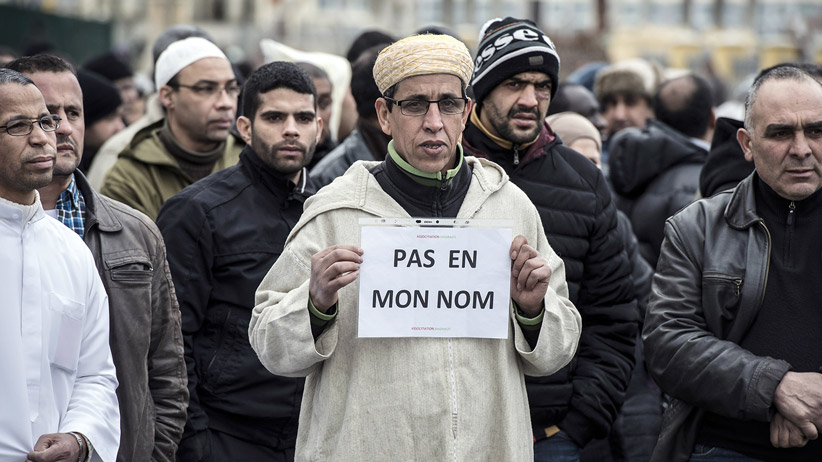
What a week, I tell you.
If nothing else, Wednesday’s slaughter of cartoonists and bystanders at Charlie Hebdo seemed at first to have a kind of mad clarity. There was cause and effect, of a twisted sort. The satirical weekly had mocked Muhammad, cheerfully and repeatedly, along with all the other targets of its scrawled cartooning over the years. Protests had greeted the Muhammad cartoons, and worse: Threats and, in 2011, a firebombing. The cartoonists, with the traditional courage of jesters, kept publishing, moved their offices, hired a police escort. Now this. As the two masked gunmen fled the scene, one of them shouted to the neighbours recording smartphone video that he had “avenged the Prophet.” It was shocking and savage, but you could see how it might make sense to fanatics.
Thursday was given over to mourning, confusion and a manhunt. That’s when I arrived, my taxi pulling up to a hotel in the 9th arrondissement just as France was supposed to observe a nationwide minute of silence for the murdered. People stood in glum clusters on narrow sidewalks in the rain, hands stuck in pockets, staring past one another. Not everyone. Many kept shopping or serving lunch.
Through the day, radio and Twitter brought news of a massive manhunt. Bernard Cazeneuve, France’s interior minister, said 88,000 police and soldiers were protecting public buildings and tracking Saïd and Chérif Kouachi, the brothers who had killed an even dozen at Charlie Hebdo and on the sidewalk outside. In mid-afternoon at the entrance to Rue Nicolas-Appert, where Charlie Hebdo had its offices, a steady stream of mourners left bouquets, candles or handwritten notes. TV crews filmed correspondents doing standups in a dozen languages. A little knot of imams scrummed non-stop for whichever news crew would ask a question.
Paul Voillemin, a 30-year-old personal trainer who lived across the street from Charlie Hebdo, stood atop a traffic barrier with a hand-lettered cardboard sign. “Catholics, Muslims, Jews, atheist— all united for liberty,” it read in French. Inevitably, another man approached Voillemin to tell him that as a Protestant he felt left out. Voillemin was contrite.
But it was only on Friday that the scale of the assault on France became clear. That’s when a single manhunt became two, and we all learned the 12 dead at Charlie Hebdo would not be the only victims, or the Kouachis the only killers.
On Friday morning police closed every road into Dammartin-en-Goële, a village northeast of Paris, where the Kouachis were making their last stand in a printing company’s warehouse. Hundreds of police moved in.
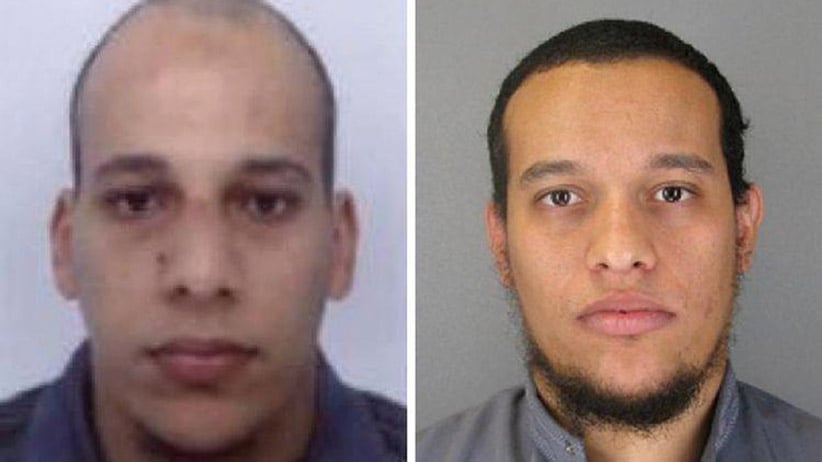
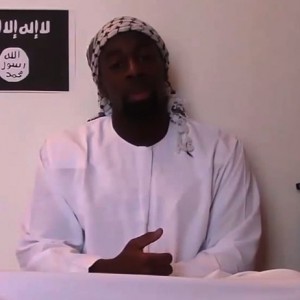 Then Amedy Coulibaly walked into the Hyper Cacher, a large kosher grocery in Paris’s east end, and started shooting.
Then Amedy Coulibaly walked into the Hyper Cacher, a large kosher grocery in Paris’s east end, and started shooting.
Coulibaly’s role, it seemed to me later, was to systematically undermine any claim the killers might have to a coherent narrative. They had avenged the Prophet by shooting cartoonists, or at least so they told themselves. Then what was Coulibaly doing murdering four shoppers who’d come for last-minute Shabbat groceries? Their only crime was to be Jews.
But if their faith was enough to justify their death, it was not enough to require it: Coulibaly told police his surviving hostages could live if the Kouachis went free in Dammartin. So much for the nobility of martyrdom. Coulibaly died haggling for his comrades’ lives. And if Judaism gave Coulibaly a pretext to kill four at Hyper Cacher, what was his excuse a day earlier in the southern Paris suburb of Montrouge? That’s where he shot Clarissa Jean-Philippe, an unarmed rookie police officer, in the back as she directed traffic. She died. Another man at the scene, a street cleaner Coulibaly shot in the face, will be lucky to survive.
But at least Jean-Philippe and the street cleaner were agents of the French state and of, I don’t know, municipal hygiene. But what did a random jogger in Fontenay-aux-Roses do on Wednesday night that made Coulibaly shoot him in the back, gravely injuring him?
Enough. Not even the most tortured logic can keep up with this random carnage. These veterans of the so-called “Buttes Chaumont Group” began training in one of Paris’s loveliest public parks for . . . something . . . in 2004. What they were training for changed over time. “It’s written in the texts”—the holy texts of Islam—“that it’s good to die as a martyr,” Chérif Kouachi told a reporter in 2005. Not that he’d read the texts, mind you. Somebody told him. In 2005 Charlie Hebdo had published no Muhammad cartoons and Clarissa Jean-Philippe was in high school. The dead died because they were handy when the Kouachis and Coulibaly decided they were ready to kill. That some were cartoonists, some were cops and four were Jews made them choice targets, but in a pinch anyone else would have done. Ahmed Merabet, who died on the sidewalk on Rue Nicolas-Appert, was Muslim. So is Lassana Bathily, who saved several customers at Hyper Cacher by hiding them in the walk-in freezer. It is impossible to imagine their assailants would have cared.
But if the victims were random, the attackers weren’t. They believed themselves to be soldiers for Islam, killing and dying for Islam, and their act throws yet another firebomb into the tortured politics of race and religion in France.
In the debate over horrible events, words quickly lose their meaning. In the taxi on my way into Paris from Charles de Gaulle aiprort, I heard Thibault de Montbrial, a lawyer and part-time terrorism analyst, tell a radio station that Jan. 7 marked “the end of France’s innocence.” I wondered what innocence there could possibly be left to lose. Leaving aside the Algerian war of independence (25,000 dead) and the Reign of Terror (41,000 dead), the Charlie Hebdo killings were only the worst in a long series of deadly attacks on French territory by Islamist fundamentalists, often against specifically Jewish targets.
A partial list might be helpful. In 1978, three terrorists tried to turn machine guns on the El Al departure desk at Charles de Gaulle airport; they killed two police officers. In 1980, four people died in a bomb explosion outside the synagogue on Rue Copernic. In 1982, six people were killed by gunfire on Rue des Rosiers in the traditionally Jewish Marais district. Ten died in attacks on public transit through the summer and fall of 1995 by an Islamist Algerian faction. And in 2012, Mohammed Merah, a 23-year-old of Algerian descent, killed three paratroopers and four people at a Jewish school during a nine-day shooting spree across southern France.
No wonder many French Jews were chilled by the massacre at the Hyper Cacher, and by two moves taken immediately after: Businesses on the Rue des Rosiers were asked by police to close early on Friday evening, and the Grand Synagogue of Paris on Rue Victoire was closed on Friday night for the first time since the Second World War. Many other synagogues stayed open, and the Rue des Rosiers was back in business when I visited late Saturday afternoon. But it’s hardly reassuring to tell French Jews the murderous assaults against members of their community are widely spaced and rarely last more than a few minutes. Last year France became, for the first time, the leading source of immigrants to Israel. In the same year, Jewish emigration from France set a new record, beating the previous record set a year earlier. Sammy Ghozlan, the leader of France’s National Bureau for Vigilance Against Anti-Semitism, announced on Jan. 5 he would emigrate to Israel. That was two days before the Charlie Hebdo shootings.
To a lot of people, the lesson was obvious. Geert Wilders, the Dutch anti-immigrant politician, recorded a video in which he demanded an end to immigration from Muslim countries and the end of the Schengen rules that allow free internal movement without border controls among 26 European countries. In Dresden, the German anti-immigration party Pegida drew 25,000 people to a march.
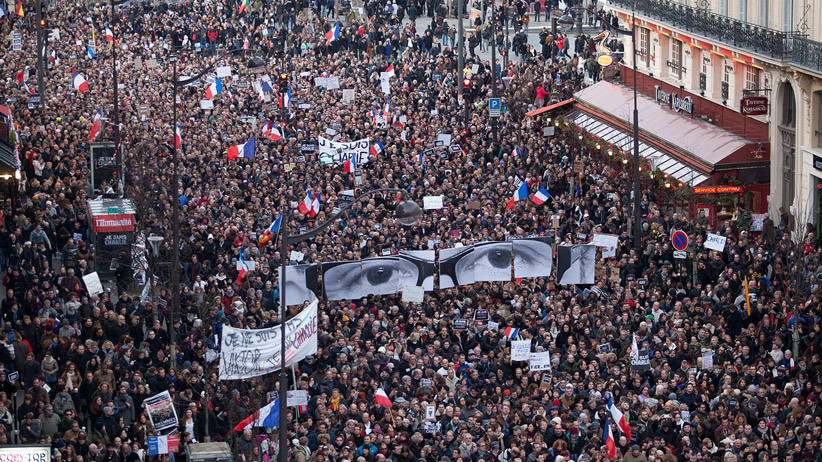
On Sunday I skipped the big republican march in Paris for a much smaller gathering in Beaucaire, near the Mediterranean south coast of France. Marine Le Pen was the event’s main attraction. Le Pen is the leader of France’s far-right National Front party, a clearing house for resentment against banks, traditional elites and immigration. Le Pen’s father, party founder Jean-Marie Le Pen, is a fusty old blowhard built like a fireplug. She is no charmer, but she has modernized the party’s image enough to make her one of France’s most prominent politicians.
Jean-Marie Le Pen knows Charlie Hebdo’s caricaturists hated him, and he sullenly returns the favour at every opportunity. Marine Le Pen is more agile. Banners hanging from Beaucaire’s town hall (the town has a National Front mayor) paid proper homage to Charlie Hebdo, as did she in her brief remarks.
But then the crowd, overwhelmingly sympathetic to Le Pen’s party, started chanting “On est chez nous”—“we are at home,” or, “this is our home”—a favourite National Front rallying cry against immigrants.
Even observers with less of a track record of obsession with immigration see the Charlie Hebdo murders, and the deliberate targeting of Jews at the Hyper Cacher, as a story about immigration. “So many North American commentators want the problem to be European violence against newcomers, not newcomer violence against Jews,” the commentator David Frum wrote on Twitter.
I’m having a hard time finding the newcomers. Amedy Coulibaly was born in Juvisy-sur-Orge, a 40-minute drive from the kosher grocery where he died with 40 bullets in his body. His girlfriend, Hayat Boumeddiene, still at large, was born in Villiers-sur-Marne. Saïd and Chérif Kouachi were born in Paris. Orphaned as children, they grew up as wards of the elaborate French social protection system. Coulibaly was one of hundreds of young French citizens enrolled in work-experience programs who met Nicolas Sarkozy at the Elysée Palace when Sarkozy was France’s president in 2009.
Coulibaly went to jail in 2013 for trying to jailbreak an organizer of the 1995 St. Michel train bombing, a formative event for a generation of French terrorists and terrorism-fighters. Chérif Kouachi’s first Salafist mentor was Farid Benyettou, also born in France. These people have lived their lives in France. They are pure products of France. Ending immigration would not have changed their trajectory. Their story is as French as that of the Three Musketeers.
All of which suggests France has a problem without an easy solution. What should it do now?
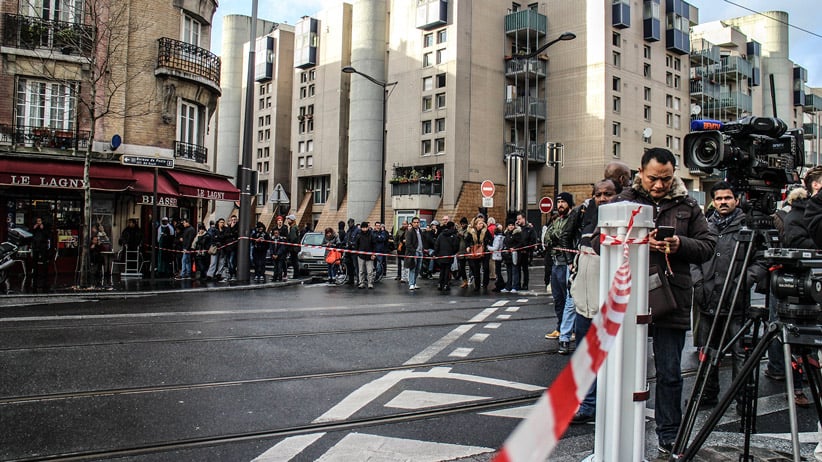
I spent most of Friday afternoon at the Porte de Vincennes, where dozens of journalists pressed up against a police line that crossed a wide boulevard and, a few blocks further east, hundreds more police planned the final assault on Coulibaly in the kosher market. I finally decided I could not add much to one of the largest press scrums I had ever seen, so I went back into central Paris to keep an appointment with Karim Amellal.
Amellal is a teacher at the Institut d’Etudes politiques de Paris and a frequent commentator on issues of Islam and the French republic. Born of a French mother and an Algerian father, “completely secular” in his own day-to-day life, he’s hard to classify, he acknowledged. “I feel concerned, implicated by what’s been happening,” he said. We were sitting in a café facing Porte-St.Denis. Amellal is 37 and he spoke with a sort of urgent precision that is the house oratorial style of Sciences Po, where he teaches.
“It’s at the same time horribly shocking and abominable, and at the same time—I can’t say it’s logical, but it’s not surprising. Not surprising because it’s been years we’ve been expecting an attack. Years, since the beginning of the war in Syria, that there’s practically been a running count of people leaving every month [for Syria from France]. There’s an enormous appeal that’s gone out, as there was in Bosnia at the beginning of the 1990s, and Afghanistan before that [after the 1980 Soviet invasion].”
The appeal is simply ignored by most French Muslims. If it had broad appeal,there would be far more than the 1,000 French fighters who are in Syria right now.
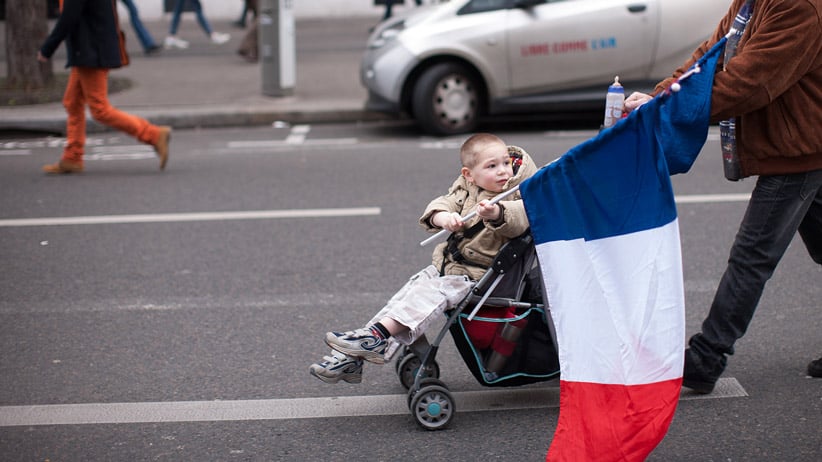
It was easy, in the aftermath of the Charlie Hebdo massacre, to find Muslims who saw no part of themselves or their faith in the carnage. Newspapers on the weekend ran a full-page ad signed by more than 500 French Muslim academics, artists and professionals deploring the attack on Charlie Hebdo. “To the killers, we say they will find us in their path, on liberty’s side,” the ad copy read.
It will be important to remember in the months ahead that most French Muslims are uninterested in violent extremism.
But some do follow the call. Often it’s people who feel some affinity, Muslims born or converted, often with, at first, only a shaky grasp of the Quran’s content.
Saïd Kouachi briefly attended Al-Eman University in Yemen, where more than a decade earlier the blue-eyed American Taliban, John Walker Lindh, studied on his way to fighting in Afghanistan.
Economic conditions may also have some effect. Long-term unemployment has been high for a generation in France, has increased sharply since 2009, and hits hardest in the largely Muslim “zones urbaines sensibles” (ZUS), hundreds of problem neighbourhoods targeted for special government intervention. Successive studies of these ZUS neighbourhoods show that their populations are shrinking only very slowly, while economic conditions rapidly deteriorate. It’s hard to escape the feeling, living in these desolate neighbourhoods on the outskirts of big cities, that France has no interest in seeing you get out.
One 2011 survey of ZUS residents found that almost 90 per cent of descendants of immigrants living there agreed with the statement, “I feel French.” But when the question was whether they were perceived as French, the number fell to 67 per cent. Among descendants of Moroccan and Tunisian immigrants the number shrinks to 40 per cent. It’s a big problem when many thousands of a country’s most economically vulnerable citizens feel their affection for France is unrequited.
Of course, money doesn’t explain everything. “The socio-economic correlation is valid for many,” Amellal said, “but it has its limits.” The Kouachi brothers, orphaned in infancy, got a decent education at a government-run foyer. Michael Zehaf-Bibeau, who gave Ottawa its own taste of terror on Oct. 22, was born to an upper middle-class family.
What binds them loosely together is a blanket rejection of everything modern societies seem to value. Amellal calls them “electrons that become free, that completely break with society. It’s not hate, it’s a rejection of everything that makes the system: elites, politics, but also values, the Republic, secularism. Of course, Charlie Hebdo was an extraordinary symbol of all of that. Extraordinary.”
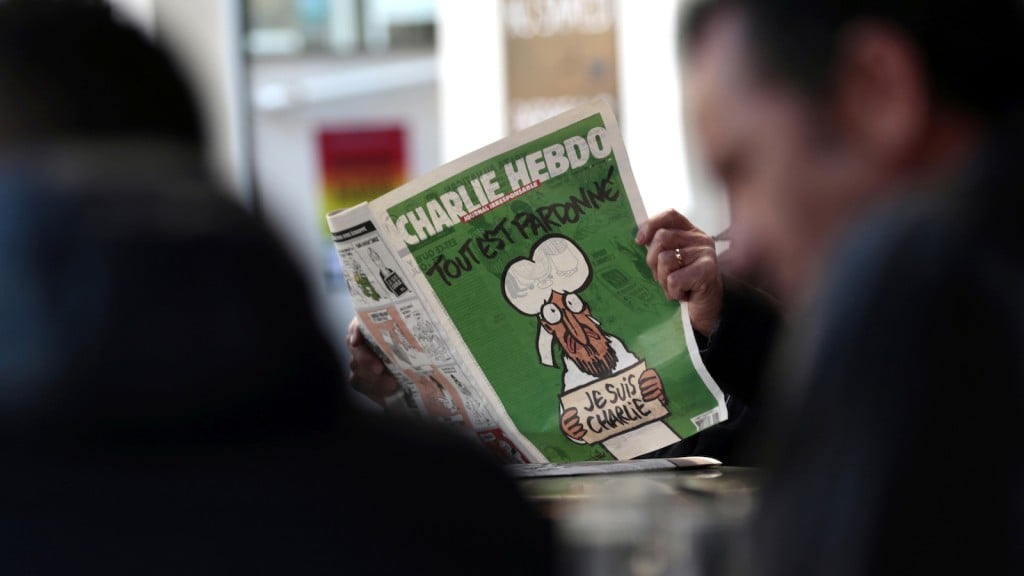
Amellal’s reaction to the shootings — shocking and abominable, but not surprising — was shared by a lot of Parisians. On the day before the Charlie Hebdo murders, Le Monde ran a review of a book by Farhad Khosrokhavar, a French-Iranian sociologist, called Radicalisation. “Across Europe,” he writes, “a lost generation of which part has slid into delinquence . . . seeks jihadist adventure to give meaning to its life.”
But of course Khosrokhavar’s slim volume was hardly the biggest book news in the hours before the shots rang out on Rue Nicolas-Appert. That honour belonged to Soumission, a dreary dystopian novel by Michel Houellebecq, the latest chain-smoking, hard-drinking bad boy of French letters.
Soumission is a deadpan chronicle of a near-future France governed by an Islamist president. Civil rights collapse, women are banished from the workplace—and it isn’t so bad after all. Unemployment goes down because fewer people are looking for work. Houellebecq’s hero, a sad-sack literary translator who bears an uncanny resemblance to Michel Houellebecq, decides the new regime might actually work in his favour because he can load up on compliant wives under the new polygamy laws. And—curtain.
Read in the most generous possible light, Soumission is a bore precisely because Houellebecq wants to depict the banality of evil, the way it can be easier to surrender than to fight. Submission to Allah is the literal meaning of Islam, and the book can be read as a wry commentary on a pliant France under the pro-Nazi Vichy regime. Whatever its significance as literature, the book has become a runaway bestseller, even as Houellebecq abandoned his promotional tour and left the country after the Charlie Hebdo attack.
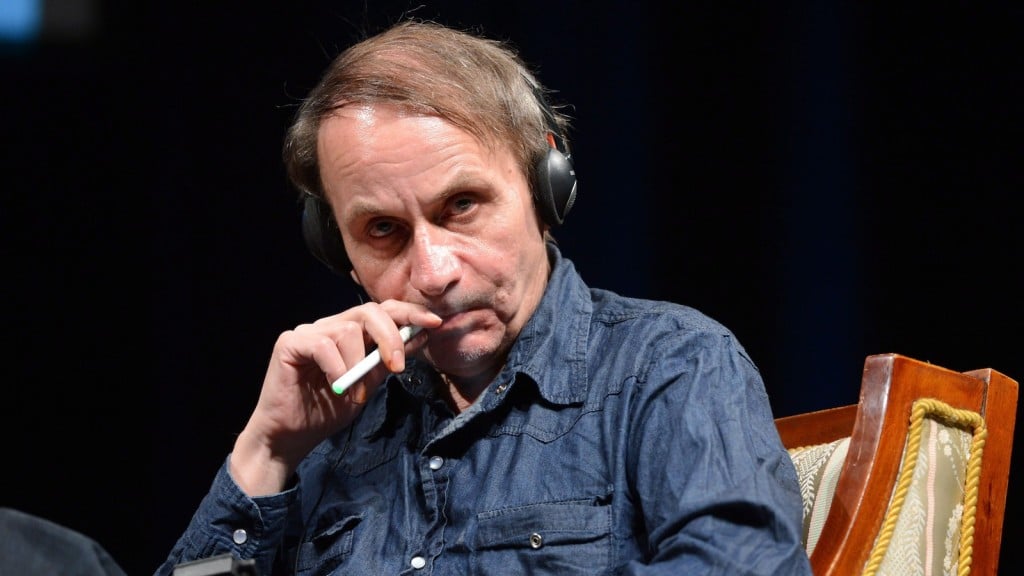
French politicians will be in no mood to submit to Islamist extremism after the week they’ve lived through. Not with a steady schedule of international anti-terrorism summits, at the European Union level and with the United States, already booked through the spring. Not with Marine Le Pen breathing down every mainstream politician’s neck. And especially not with the prospect, and the concrete evidence, of a burgeoning exodus of French Jews that must be stemmed.
But reaction can be as dangerous as complacency. The Muslims of France are there. They have spent their lives in France, learned its history and its pop culture, and in most cases want nothing more than to participate in France’s still sorely unrealized potential.
This could be the final failure of Chérif and Saïd Kouachi and Amedy Coulibaly. Even as they carried out their spree, they kept meeting French Muslims standing against them: Ahmed Merabet the cop, Lassana Bathily the stockboy at the kosher grocery. The polarizing effect of the attacks isn’t over. The murders forced everyone in France to pick a side. Most—not all but most—French Muslims are happy and eager to pick freedom’s side. It would be tragic if nobody in power dared listen to them.